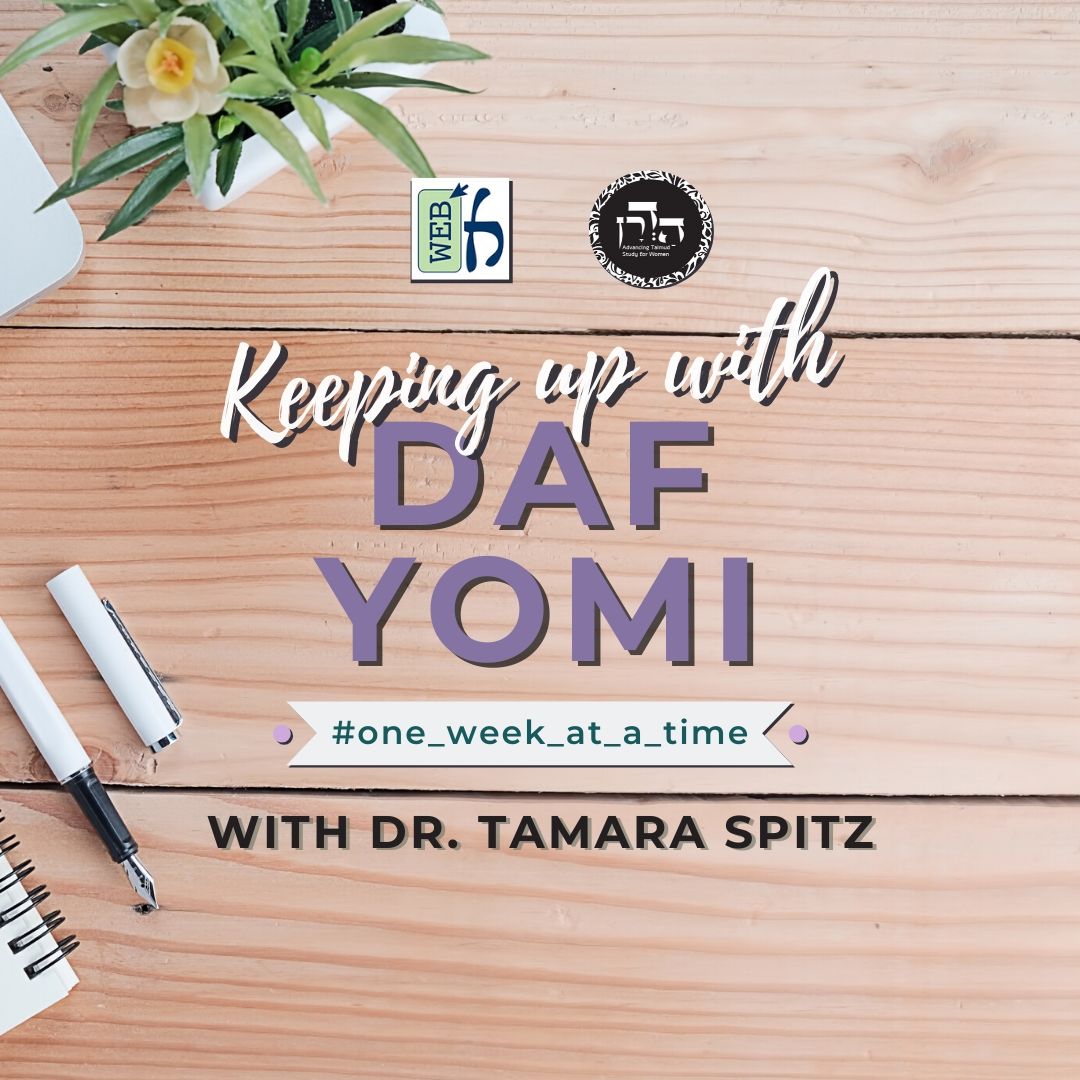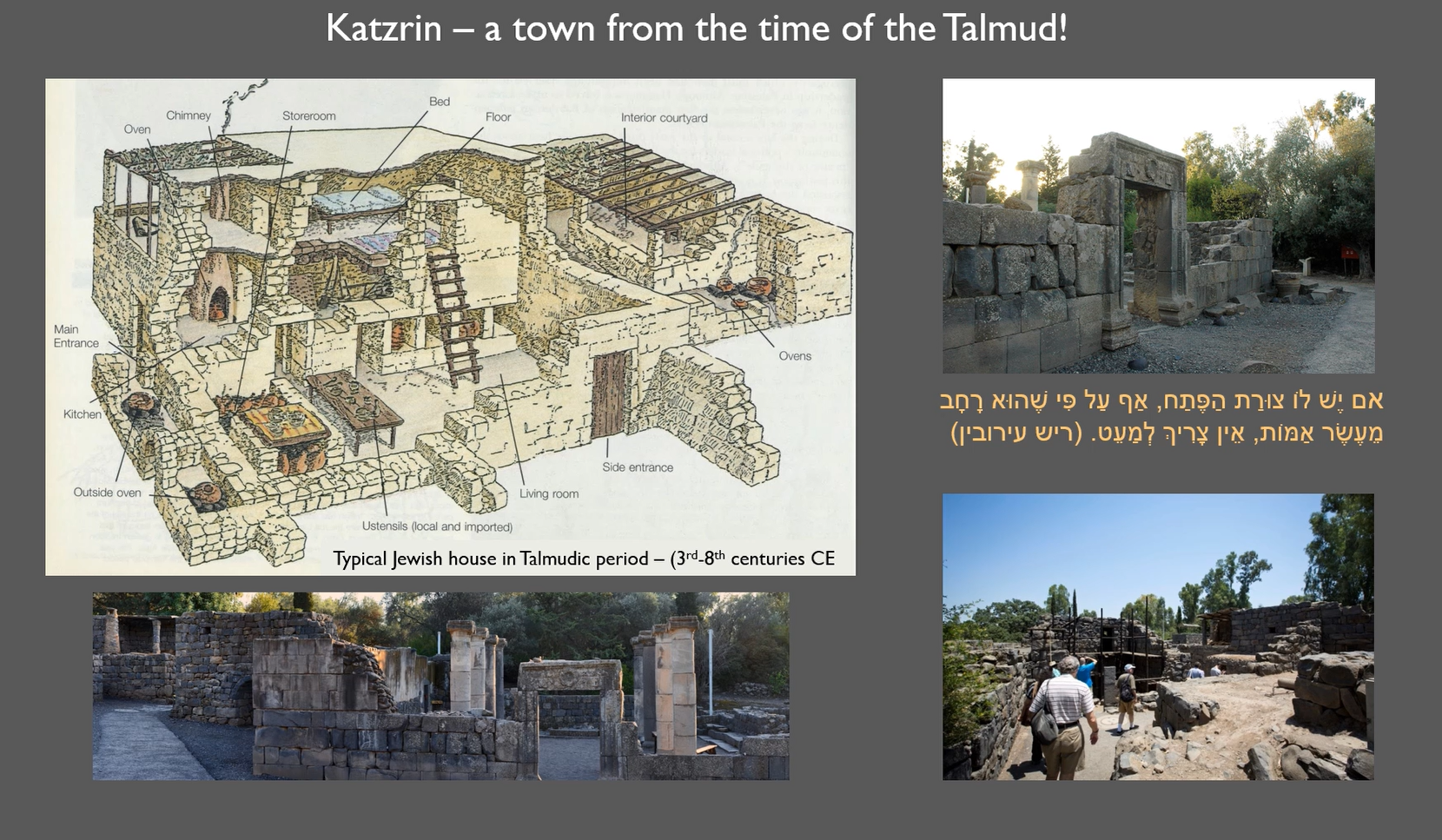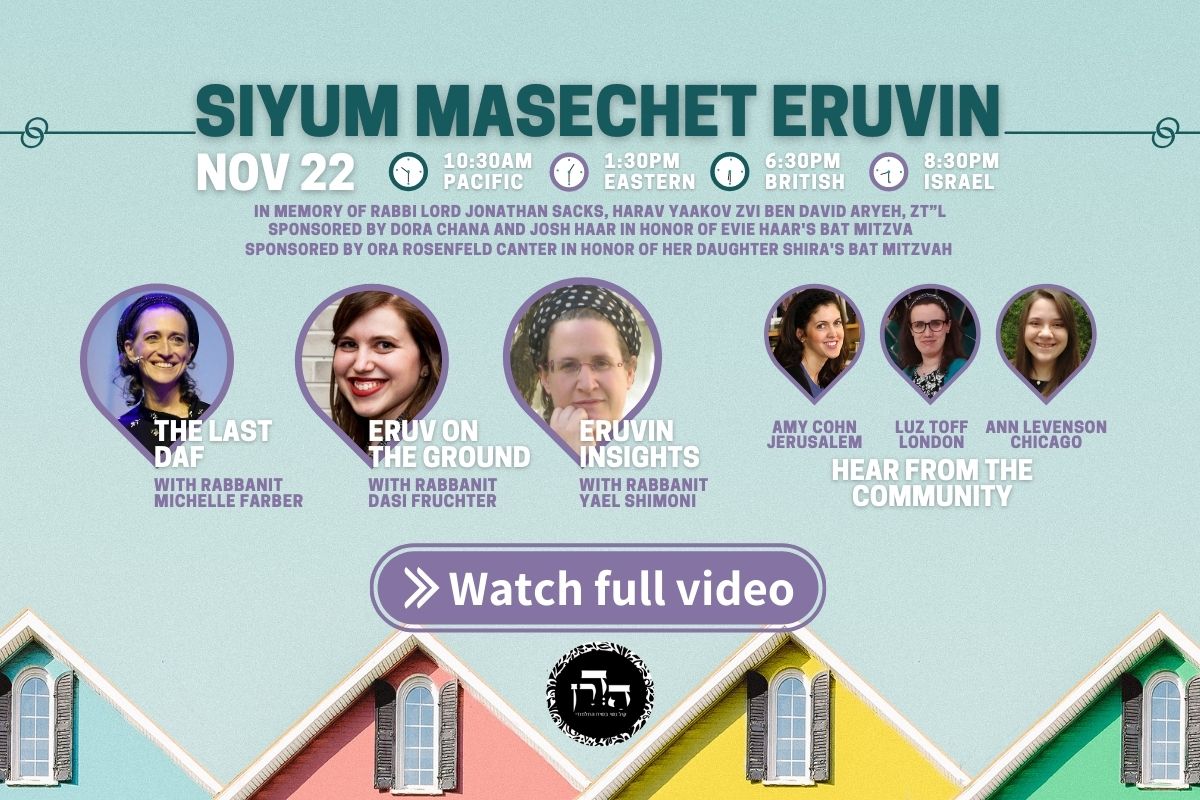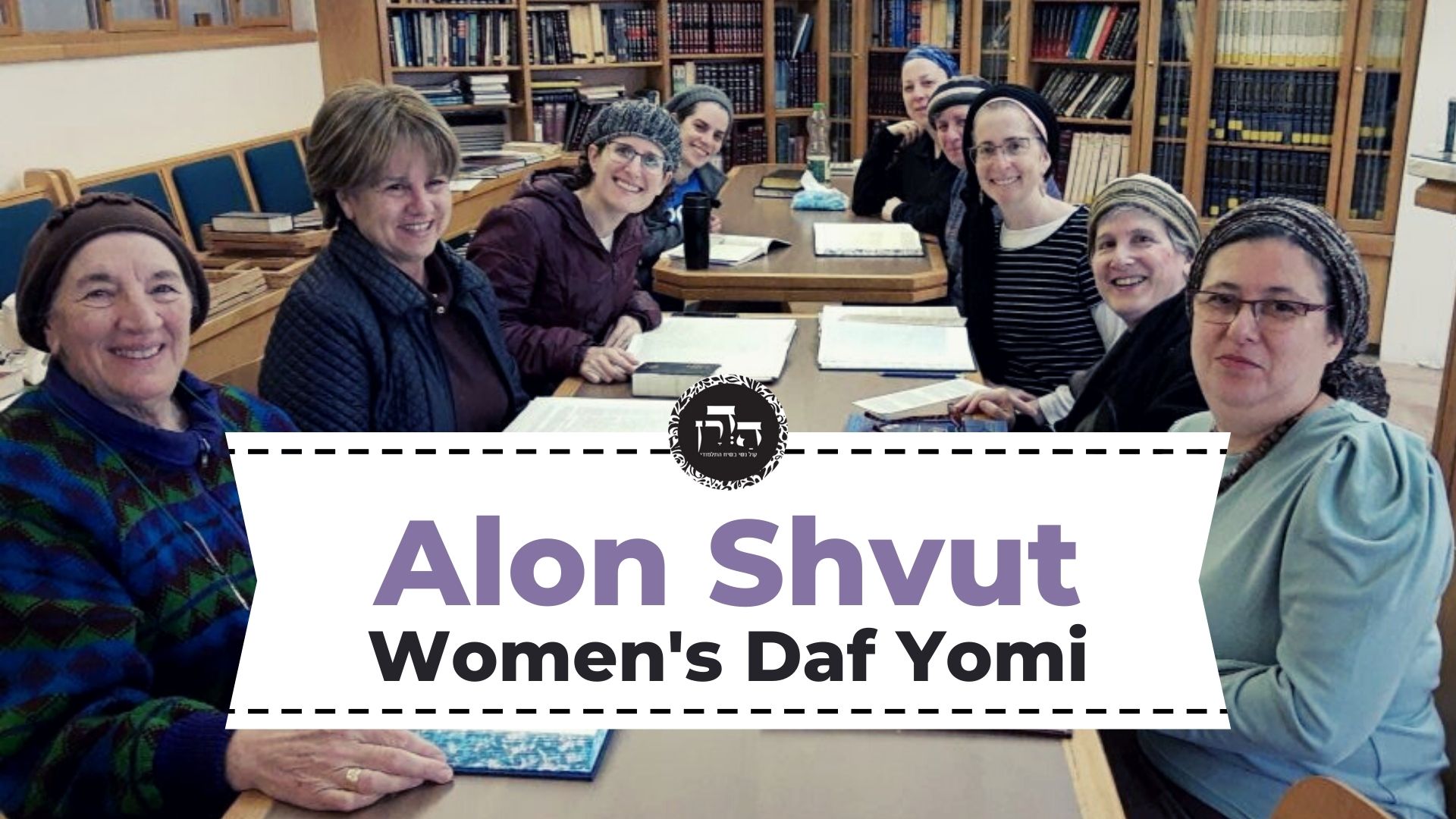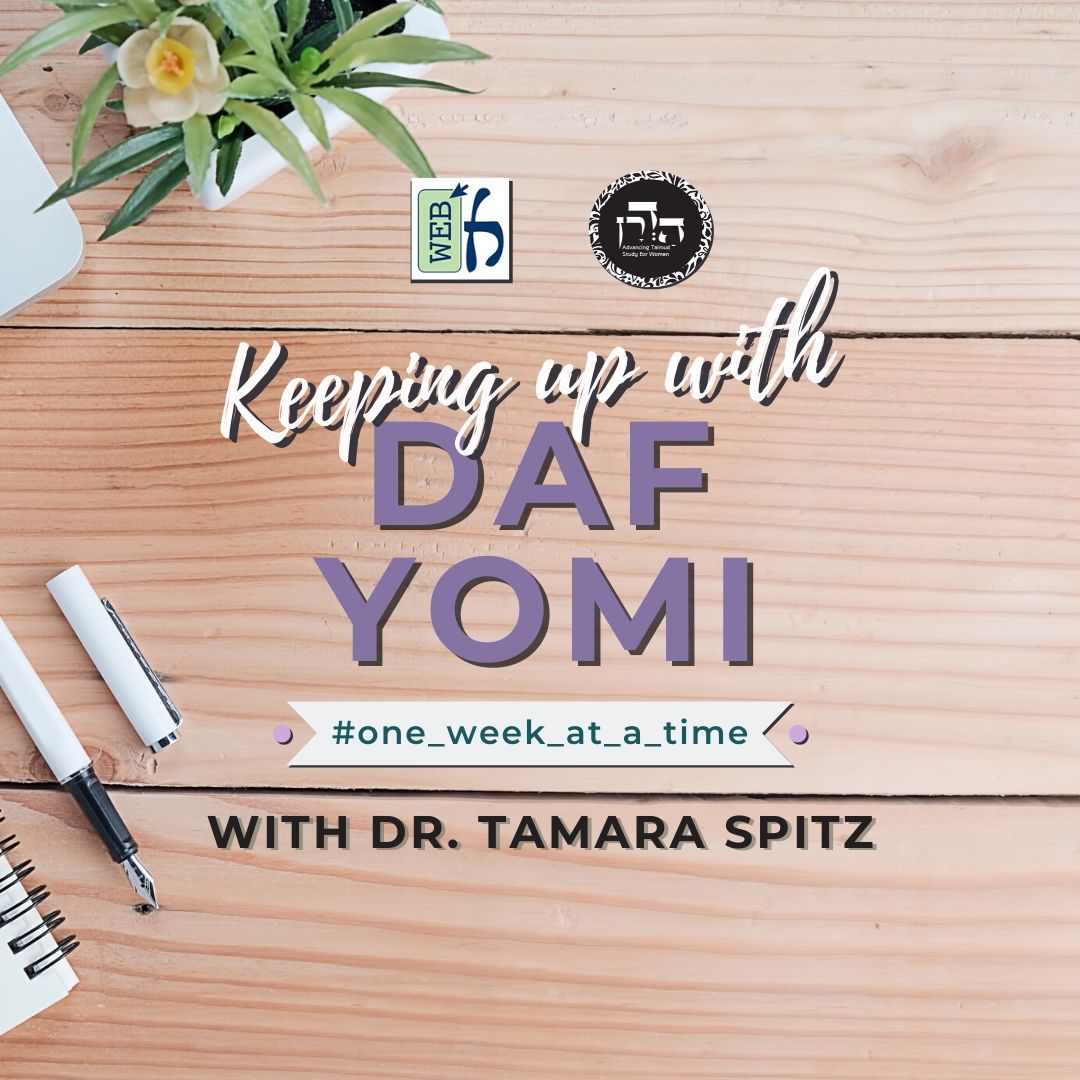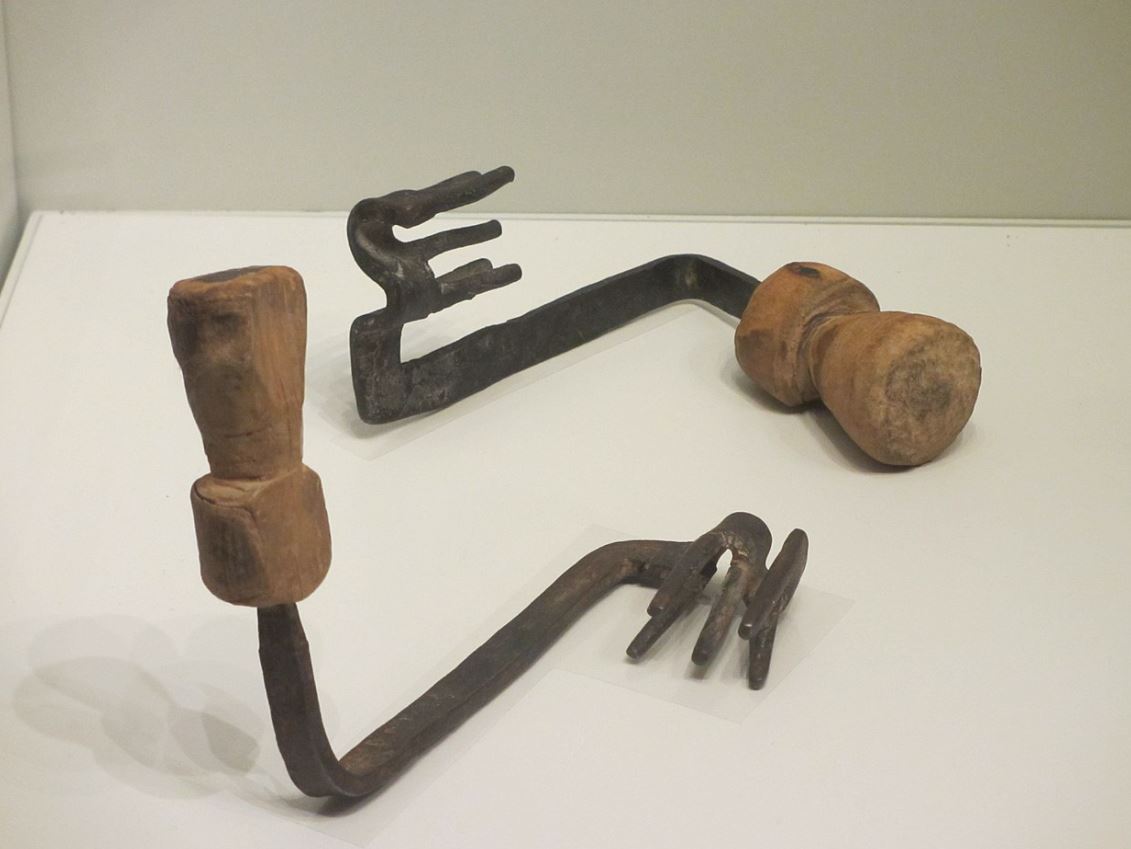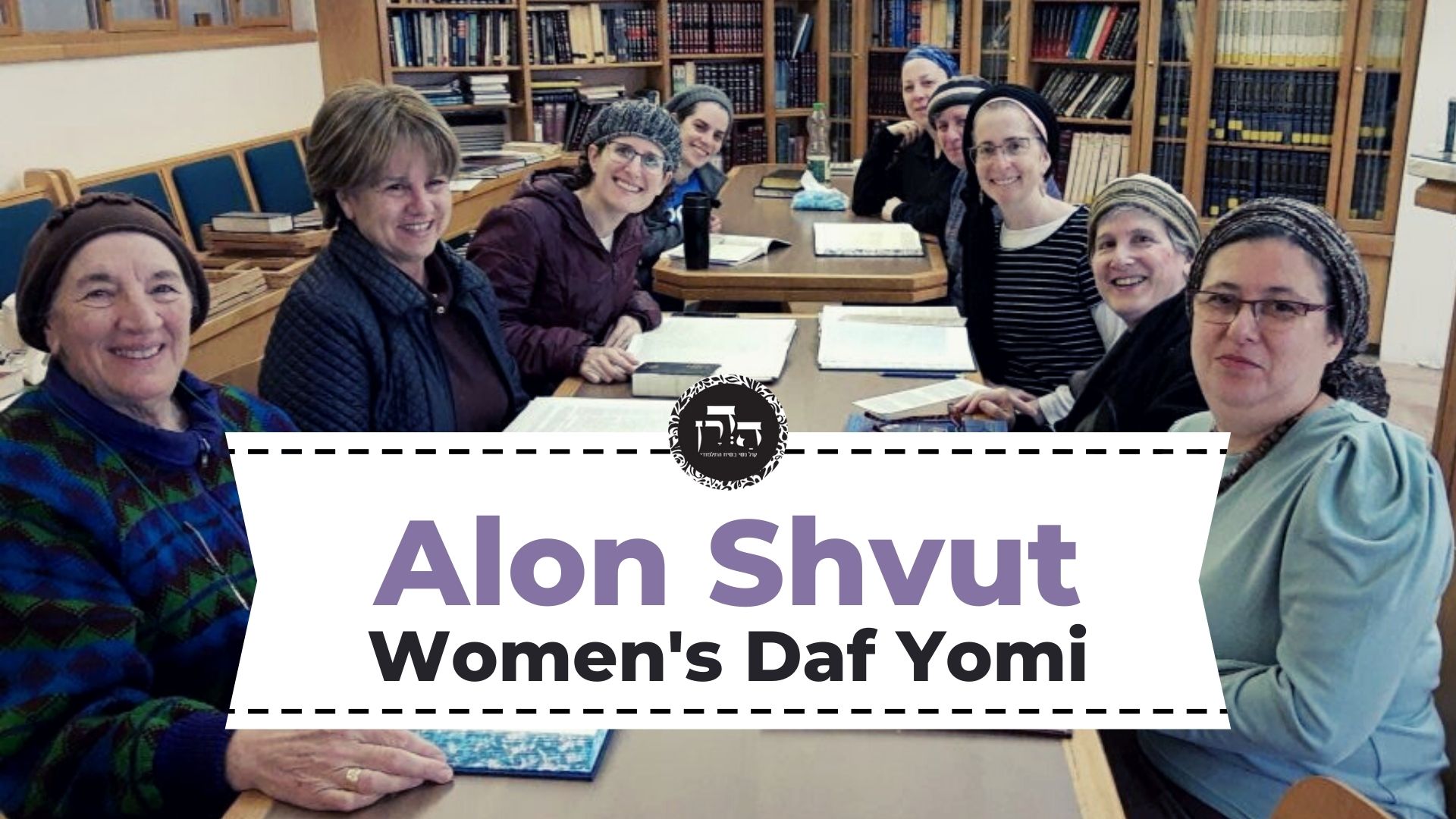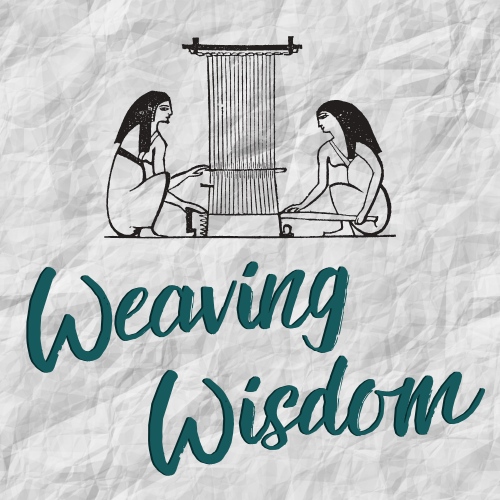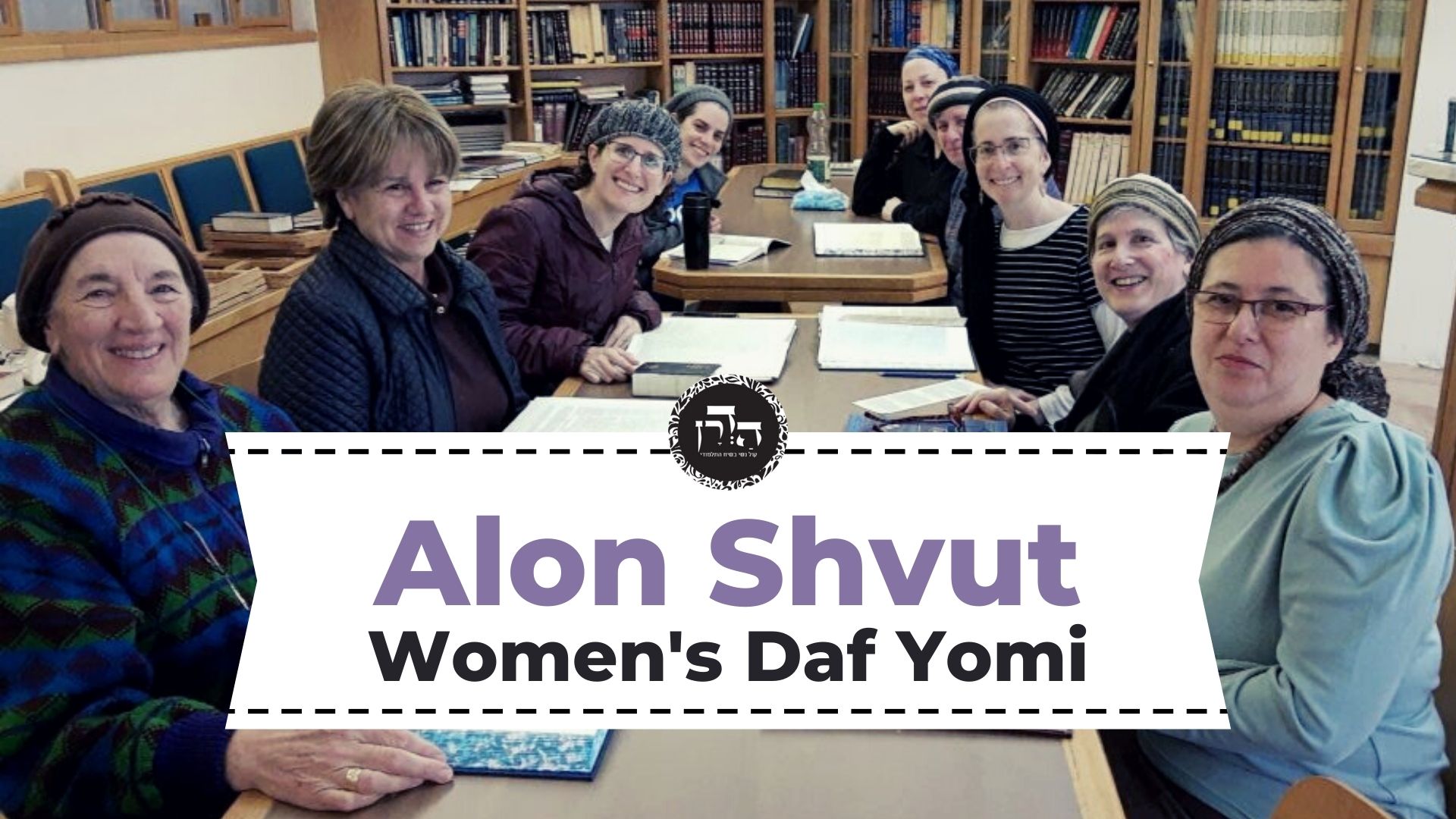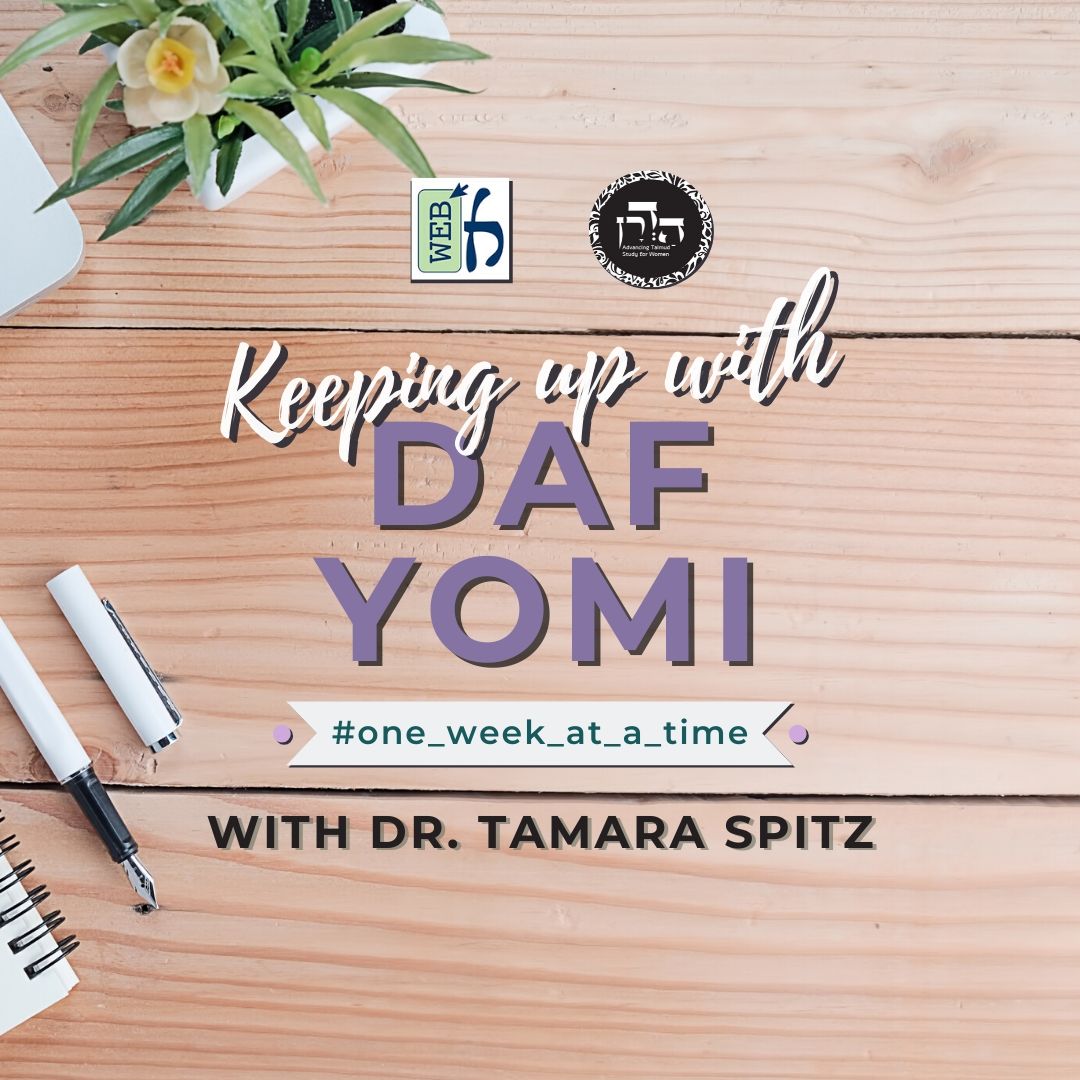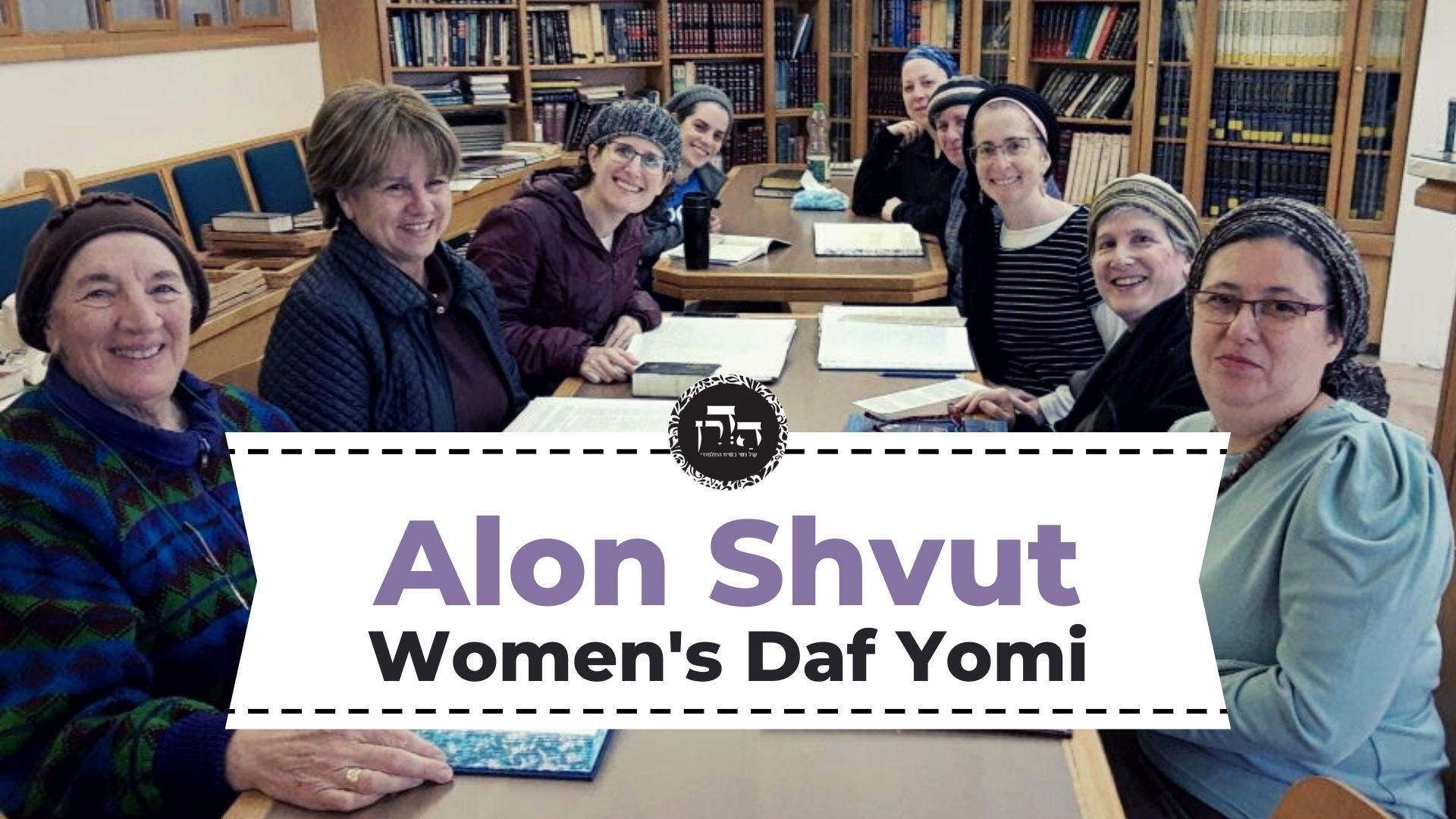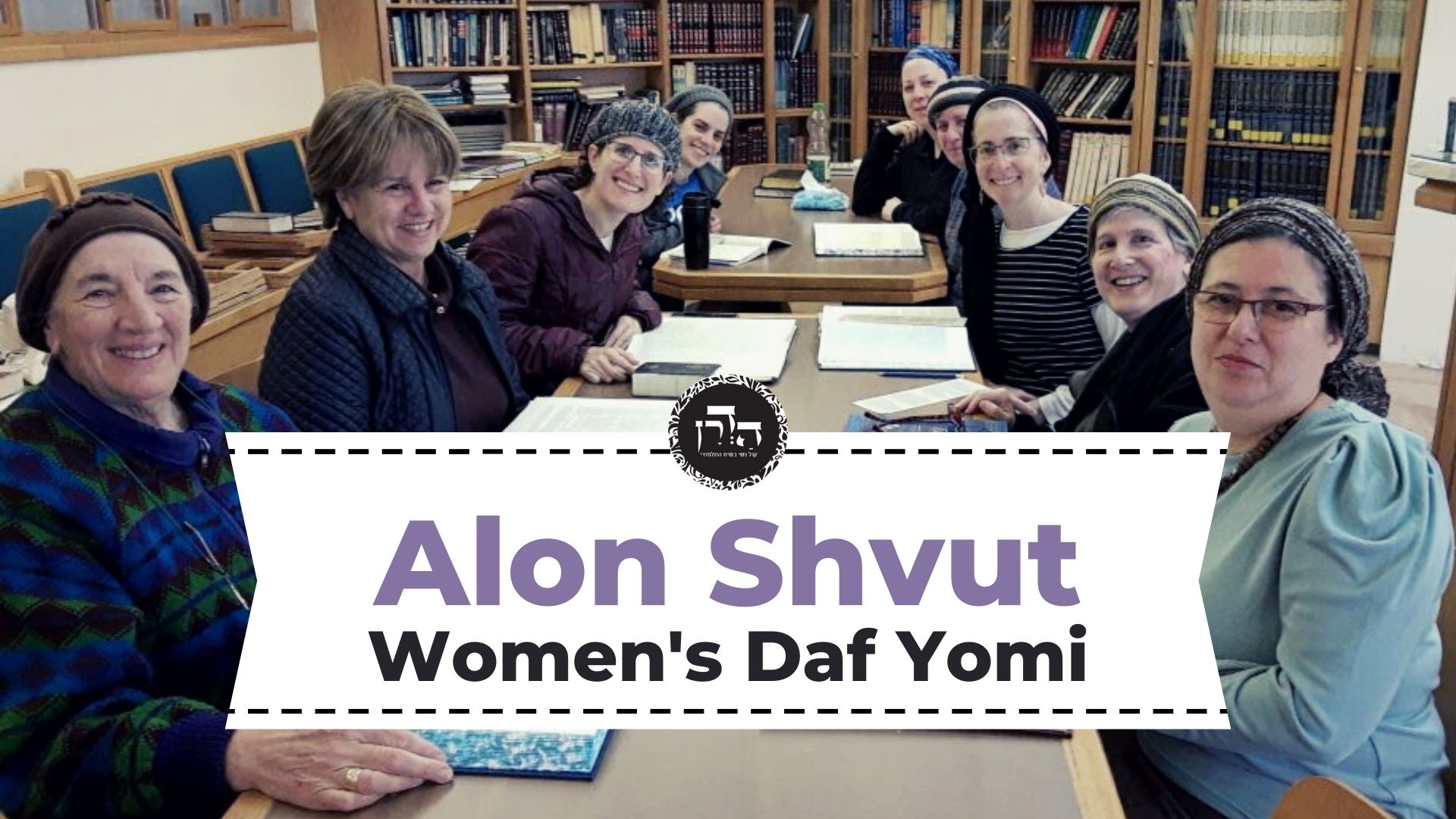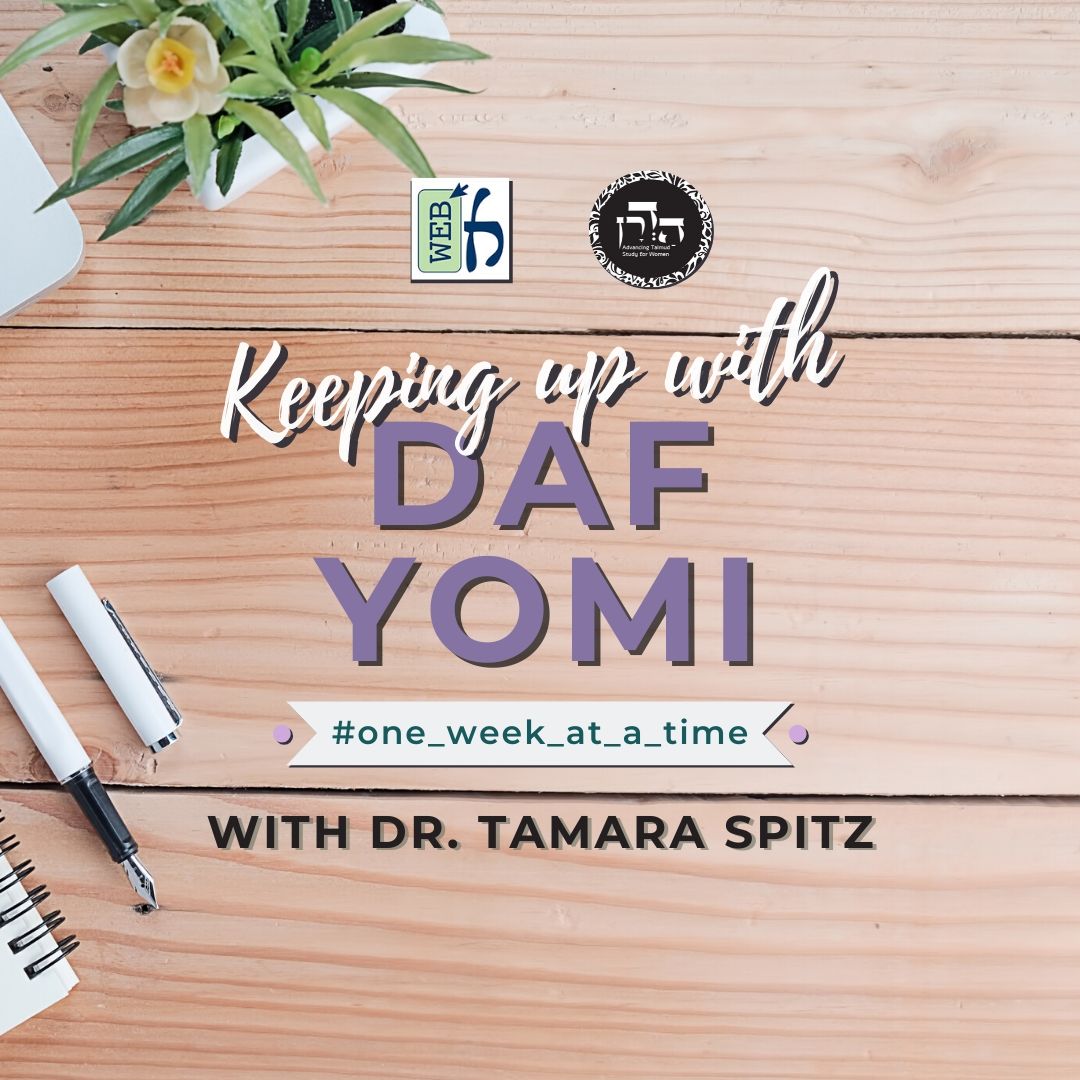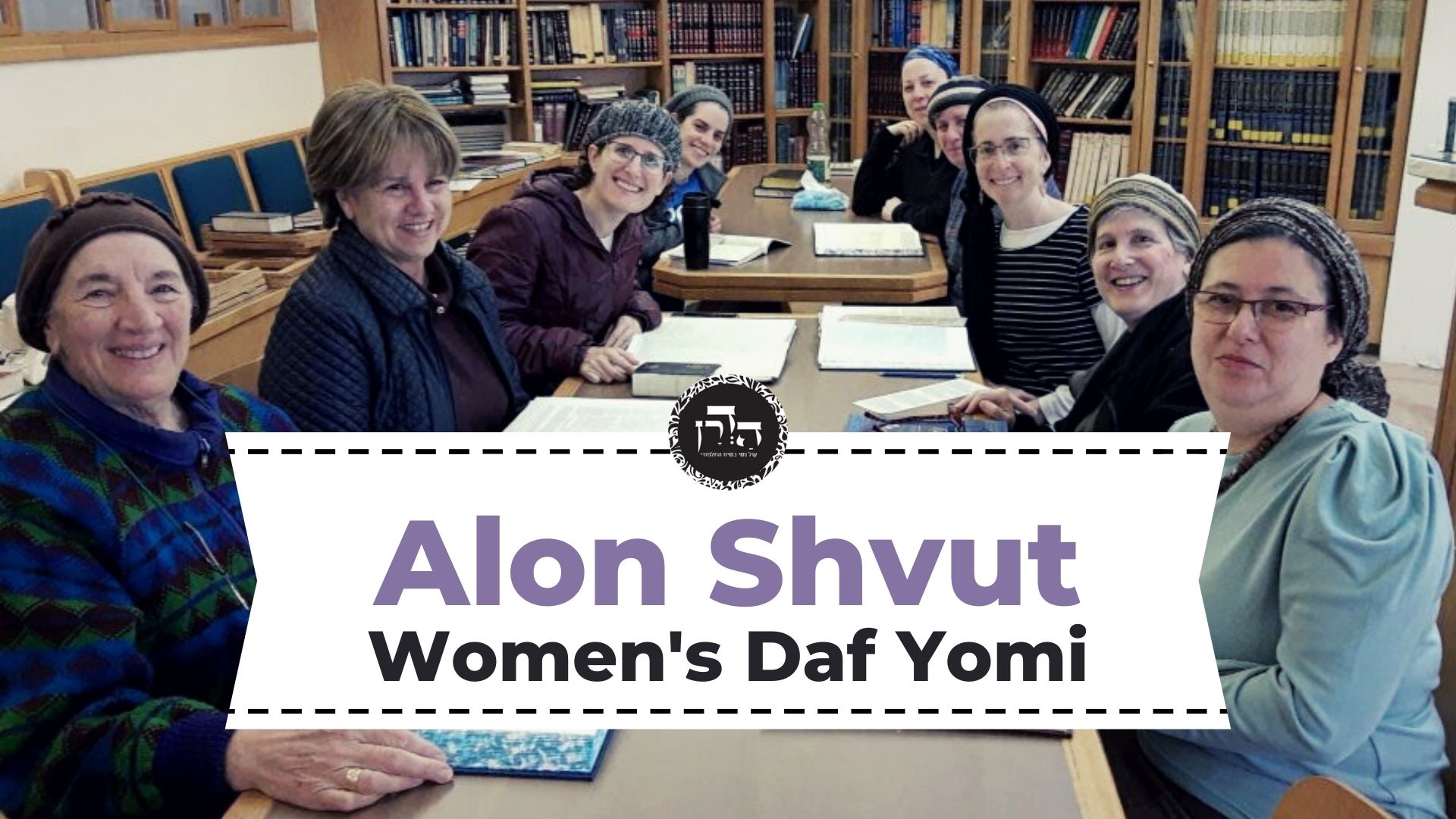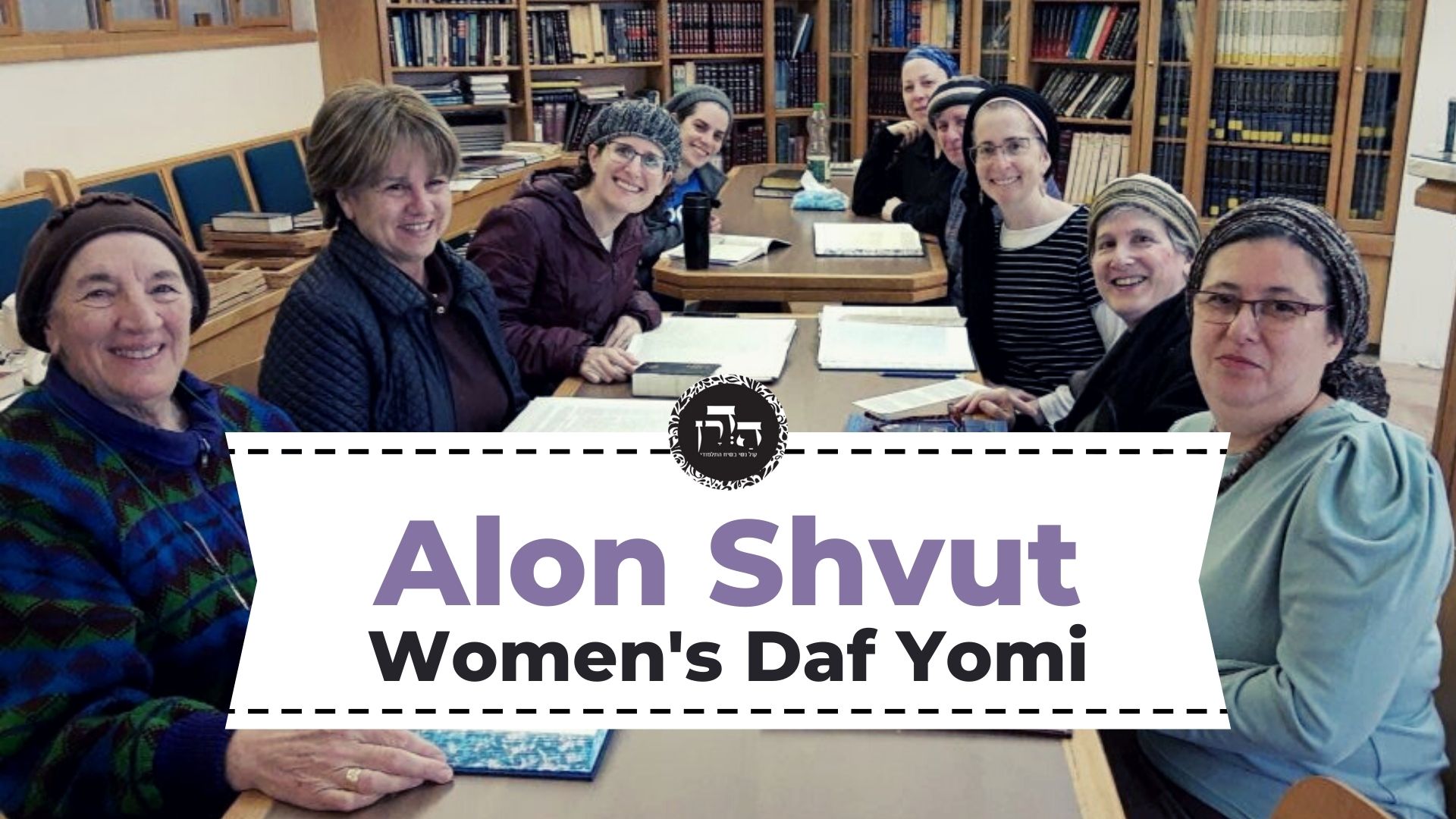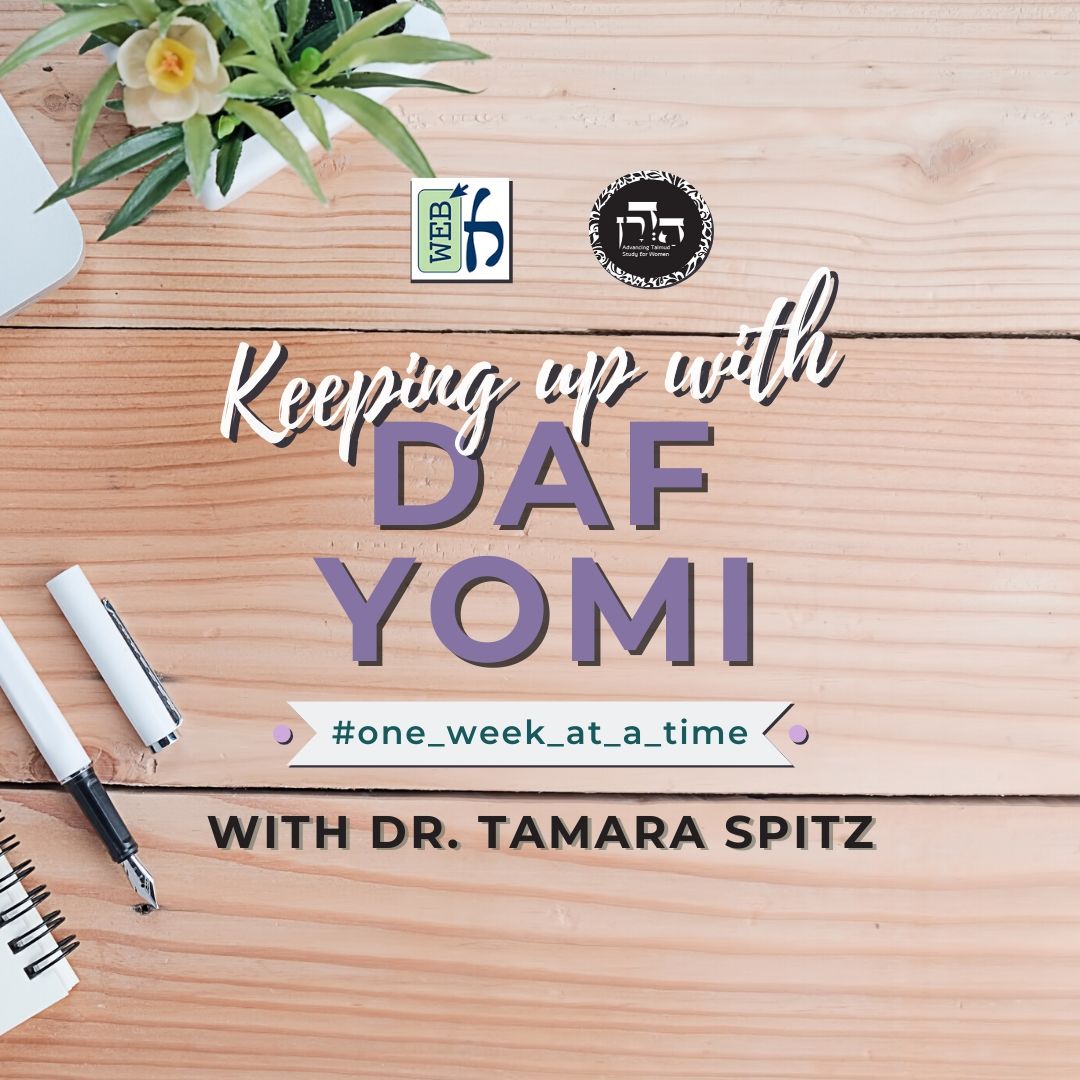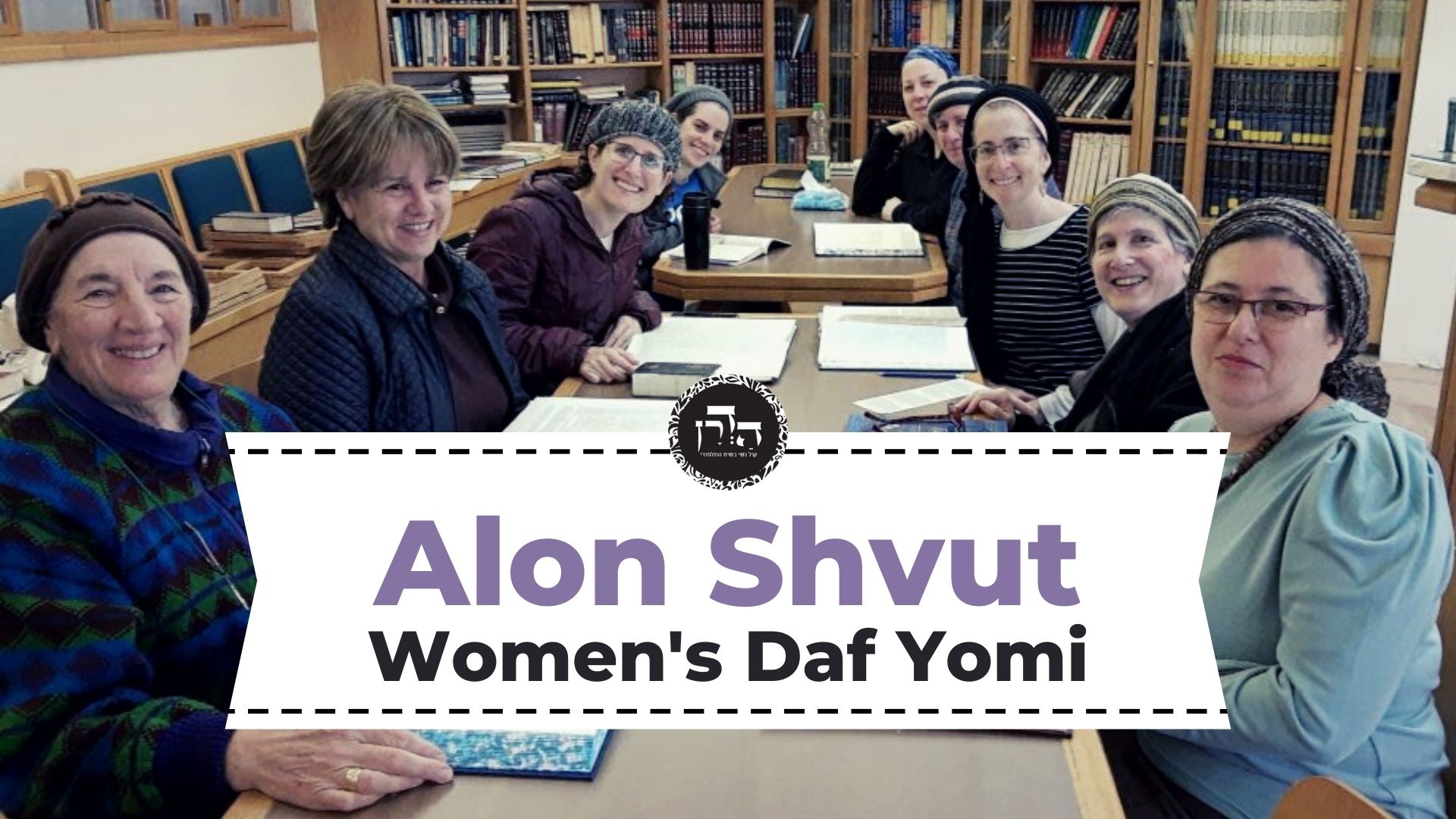The gemara discusses other things that are permitted in the Temple but not outside the Temple. If you find an impure dead creature (on of the eight that according to the Torah are impure) in the Temple, how do you remove it and if it is Shabbat, how far do you carry it out to remove it, despite the fact that it is muktze?
This month’s learning is dedicated to the refuah shleima of our dear friend, Phyllis Hecht, גיטל פעשא בת מאשה רחל by all her many friends who love and admire her. Phyllis’ emuna, strength, and positivity are an inspiration.
This week’s learning is sponsored by the Miller Rotenberg family in loving memory of their daughter Tanielle Miller on her 21st yahrzeit. “We honor and celebrate her memory by continuing the paths she forged, keeping her love of community, chesed, Israel, and learning, alive and vibrant.”
Want to dedicate learning? Get started here:


Today’s daily daf tools:
This month’s learning is dedicated to the refuah shleima of our dear friend, Phyllis Hecht, גיטל פעשא בת מאשה רחל by all her many friends who love and admire her. Phyllis’ emuna, strength, and positivity are an inspiration.
This week’s learning is sponsored by the Miller Rotenberg family in loving memory of their daughter Tanielle Miller on her 21st yahrzeit. “We honor and celebrate her memory by continuing the paths she forged, keeping her love of community, chesed, Israel, and learning, alive and vibrant.”
Today’s daily daf tools:
Delve Deeper
Broaden your understanding of the topics on this daf with classes and podcasts from top women Talmud scholars.
New to Talmud?
Check out our resources designed to help you navigate a page of Talmud – and study at the pace, level and style that fits you.
The Hadran Women’s Tapestry
Meet the diverse women learning Gemara at Hadran and hear their stories.
Eruvin 104
שָׁלֹשׁ עַל שָׁלֹשׁ — חוֹצְצוֹת, פָּחוֹת מִשָּׁלֹשׁ — אֵין חוֹצְצוֹת, וְהַיְינוּ דְּרָבָא אָמַר רַב חִסְדָּא.
If the fabric was three fingerbreadths by three fingerbreadths, it interposes; but if it was less than three fingerbreadths by three fingerbreadths, it does not interpose. And this is the same teaching that Rava said that Rav Ḥisda said.
לֵימָא פְּלִיגָא דְּרַב יְהוּדָה בְּרֵיהּ דְּרַבִּי חִיָּיא? שָׁאנֵי צִלְצוֹל קָטָן דַּחֲשִׁיב.
The Gemara suggests: Let us say that this disagrees with the opinion of Rav Yehuda, son of Rabbi Ḥiyya, who prohibits a sash even smaller than three fingerbreadths by three fingerbreadths. The Gemara rejects this contention: This is not necessarily so, as a small sash is different, since it is significant. It is therefore like a garment, even if it is smaller than three fingerbreadths by three fingerbreadths.
וּלְרַבִּי יוֹחָנָן: אַדְּאַשְׁמְעִינַן גֶּמִי לַישְׁמְעִינַן צִלְצוֹל קָטָן!
The Gemara raises a question: And according to the opinion of Rabbi Yoḥanan: Rather than teaching us the halakha with regard to a reed, let the mishna teach us that a priest may wrap his wounded finger with a small sash, as that does not constitute an interposition.
מִילְּתָא אַגַּב אוֹרְחֵיהּ קָא מַשְׁמַע לַן, דְּגֶמִי מַסֵּי.
The Gemara explains: The tanna teaches us another matter in passing, that a reed heals. However, as far as a priest involved in the service in concerned, there is no concern with regard to this prohibition either, as it is also a rabbinic decree that is not in effect in the Temple.
מַתְנִי׳ בּוֹזְקִין מֶלַח עַל גַּבֵּי כֶּבֶשׁ בִּשְׁבִיל שֶׁלֹּא יַחְלִיקוּ, וּמְמַלְּאִין מִבּוֹר הַגּוֹלָה וּמִבּוֹר הַגָּדוֹל בַּגַּלְגַּל בַּשַּׁבָּת, וּמִבְּאֵר הַקַּר בְּיוֹם טוֹב.
MISHNA: One may scatter salt on Shabbat on the ramp that leads to the altar so that the priests will not slip on their way up. And likewise, one may draw water from the Cistern of the Exiles and from the Great Cistern, which were located in the Temple, by means of the wheel designed for drawing water, even on Shabbat. And one may draw water from the Heker Well only on a Festival.
גְּמָ׳ רָמֵי לֵיהּ רַב אִיקָא מִפַּשְׁרוּנְיָא לְרָבָא, תְּנַן: בּוֹזְקִין מֶלַח עַל גַּבֵּי הַכֶּבֶשׁ בִּשְׁבִיל שֶׁלֹּא יַחֲלִיקוּ. בַּמִּקְדָּשׁ — אִין, בַּמְּדִינָה — לָא. וּרְמִינְהִי: חָצֵר שֶׁנִּתְקַלְקְלָה בְּמֵימֵי גְשָׁמִים — מֵבִיא תֶּבֶן וּמְרַדֶּה בָּהּ!
GEMARA: Rav Ika from Pashronya raised a contradiction before Rava: We learned in the mishna: One may scatter salt on Shabbat on the ramp that leads to the altar, so that the priests will not slip, from which it can be inferred: In the Temple, yes, it is permitted to do so, but outside the Temple, in the rest of the country, no, it is prohibited to scatter salt on a ramp. And he raised his contradiction from a baraita: With regard to a courtyard that was damaged on Shabbat by rainwater, so that it became difficult to cross, one may bring straw and scatter it about to absorb the water. Apparently, an action of this kind is permitted even outside the Temple.
שָׁאנֵי תֶּבֶן, דְּלָא מְבַטֵּיל לֵיהּ.
The Gemara answers: Straw is different, as one does not negate it; rather, he intends to remove it once the water has been absorbed. He is therefore permitted to scatter the straw in the courtyard, just as it is permitted to put it in any other place. However, it is prohibited to scatter objects that one intends to leave in place, such as salt, as this appears as though he is adding to the ground and building.
אֲמַר לֵיהּ רַב אַחָא בְּרֵיהּ דְּרָבָא לְרַב אָשֵׁי: הַאי מֶלַח הֵיכִי דָמֵי? אִי דִּמְבַטְּלֵיהּ — קָא מוֹסֵיף אַבִּנְיָן (וּכְתִיב: ״הַכֹּל בִּכְתָב מִיַּד ה׳ עָלַי הִשְׂכִּיל״).
Rav Aḥa, son of Rava, said to Rav Ashi: This salt, what are the circumstances? If one negates it vis-à-vis the ramp so that it becomes part of the ramp, he effectively adds to the structure of the Temple, and it states with regard to the Temple: “All this do I give you in writing as God has made me wise by His hand upon me, even all the works of this pattern” (I Chronicles 28:19). This verse indicates that all the details of the Temple structure were determined through prophecy and may not be changed in any way, even on a weekday.
וְאִי דְּלָא קָא מְבַטְּלֵיהּ, קָא הָוְיָא חֲצִיצָה.
And if he does not negate the salt vis-à-vis the ramp, it would constitute an interposition between the feet of the priests and the altar. This would mean that they would not be walking on the ramp during their service, and consequently they would not be performing the service as required by the Torah.
בְּהוֹלָכַת אֵבָרִים לַכֶּבֶשׁ, דְּלָאו עֲבוֹדָה הִיא.
The Gemara answers: In fact, he does not negate the salt. However, he scatters it when the limbs of the sacrifice are brought up the ramp, a procedure that is not considered part of the Temple service subject to disqualification due to interposition, as it is merely preparation for the burning of the limbs.
וְלָא? וְהָא כְּתִיב: ״וְהִקְרִיב הַכֹּהֵן אֶת הַכֹּל וְהִקְטִיר הַמִּזְבֵּחָה״, וְאָמַר מָר: זוֹ הוֹלָכַת אֵבָרִים לַכֶּבֶשׁ! אֶלָּא אֵימָא: בְּהוֹלָכַת עֵצִים לַמַּעֲרָכָה, דְּלָאו עֲבוֹדָה הִיא.
The Gemara asks: And is this not a service? But isn’t it written: “And the priest shall offer it whole and make it smoke upon the altar” (Leviticus 1:13), and the Master said in explanation: This is referring to bringing the limbs to the top of the ramp. Evidently, this too is a service written in the Torah. Rather, say that he scatters the salt when the wood is brought up the ramp to the arrangement of wood on the altar, a procedure that is not a service.
דָּרֵשׁ רָבָא: חָצֵר שֶׁנִּתְקַלְקְלָה בְּמֵימֵי גְשָׁמִים — מֵבִיא תֶּבֶן וּמְרַדֶּה בָּהּ. אֲמַר לֵיהּ רַב פָּפָּא לְרָבָא, וְהָתַנְיָא: כְּשֶׁהוּא מְרַדֶּה — אֵינוֹ מְרַדֶּה לֹא בְּסַל וְלֹא בְּקוּפָּה, אֶלָּא בְּשׁוּלֵי קוּפָּה!
Rava taught: In a courtyard that was damaged on Shabbat by rainwater, one may bring straw and scatter it about to make it easier to walk across. Rav Pappa said to Rava: But wasn’t it taught in a baraita: When one scatters the straw, he must not scatter it either with a small basket or with a large basket, but only with the bottom of a broken basket, i.e., he must scatter the straw in a manner different from that of an ordinary weekday. Rava, however, indicates that he may scatter the straw in the usual fashion.
הֲדַר אוֹקֵים רָבָא אָמוֹרָא עֲלֵיהּ וּדְרַשׁ: דְּבָרִים שֶׁאָמַרְתִּי לִפְנֵיכֶם טָעוּת הֵן בְּיָדִי, בְּרַם כָּךְ אָמְרוּ מִשּׁוּם רַבִּי אֱלִיעֶזֶר: וּכְשֶׁהוּא מְרַדֶּה — אֵינוֹ מְרַדֶּה לֹא בְּסַל וְלֹא בְּקוּפָּה, אֶלָּא בְּשׁוּלֵי קוּפָּה.
Rava then appointed an amora before him to publicize his teaching, and taught: The statement I issued before you was a mistake of mine. However, in fact they said in the name of Rabbi Eliezer as follows: And when one scatters the straw, he must not scatter it either with a small basket or with a large basket, but only with the bottom of a broken basket.
מְמַלְּאִין מִבּוֹר הַגּוֹלָה. עוּלָּא אִיקְּלַע לְבֵי רַב מְנַשֶּׁה, אֲתָא הָהוּא גַּבְרָא טְרַף אַבָּבָא אֲמַר: מַאן הַאי? לִיתַּחַל גּוּפֵיהּ, דְּקָא מַחֵיל לֵיהּ לְשַׁבְּתָא.
We learned in the mishna: One may draw water from the Cistern of the Exiles by means of a wheel. The Gemara relates: Ulla happened to come to the house of Rav Menashe when a certain man came and knocked at the door. Ulla said: Who is that? May his body be desecrated, as he desecrates Shabbat by producing a sound.
אֲמַר לֵיהּ רַבָּה: לֹא אָסְרוּ אֶלָּא קוֹל שֶׁל שִׁיר. אֵיתִיבֵיהּ אַבָּיֵי: מַעֲלִין בִּדְיוֹפִי וּמַטִּיפִין מֵיאֶרֶק לַחוֹלֶה בַּשַּׁבָּת.
Rabba said to him: The Sages prohibited only a pleasant musical sound on Shabbat, not the rasping sound of knocking on a door. Abaye raised an objection to Rabba from a baraita: One may draw up wine from a barrel with a siphon [diyofei], and one may drip water from a vessel that releases water in drops [miarak], for an ill person on Shabbat.
לַחוֹלֶה אִין, לַבָּרִיא לָא. הֵיכִי דָּמֵי? לָאו דְּנָיֵם וְקָא בָּעֵי דְּלִיתְּעַר. שְׁמַע מִינַּהּ: אוֹלוֹדֵי קָלָא אֲסִיר!
The Gemara infers: For an ill person, yes, this is permitted, but for a healthy person, no, one may not do so, what are the circumstances? Is it not the case that he is dozing off and they wish to waken him, and as they do not want to alarm him due to his illness, they do it by means of the sound of water poured from a vessel? And one can learn from here that it is prohibited to produce a sound on Shabbat, even one that is unpleasant, as the Sages permitted this only for an ill person.
לָא: דְּתִיר, וְקָא בָּעֵי דְּלֵינִים — דְּמִשְׁתַּמֵּעַ כִּי קָלָא דְזִמְזוּמֵי.
The Gemara rejects this contention: No, it is referring to an ill person who is awake and whom they want to have fall asleep, and to this end they let water fall in drops, producing a sound that is heard as melodious.
אֵיתִיבֵיהּ: הַמְשַׁמֵּר פֵּירוֹתָיו מִפְּנֵי הָעוֹפוֹת, וּדְלֻעָיו מִפְּנֵי הַחַיָּה — מְשַׁמֵּר כְּדַרְכּוֹ בְּשַׁבָּת, וּבִלְבַד שֶׁלֹּא יִסְפֹּק וְלֹא יְטַפֵּחַ וְלֹא יְרַקֵּד כְּדֶרֶךְ שֶׁהֵן עוֹשִׂין בַּחוֹל.
Abaye raised another objection to Rabba from a baraita: One who is guarding his produce from birds or his gourds from beasts may guard them, in the manner that he typically does so, on Shabbat, as his guarding does not entail a prohibited labor, provided that he neither claps, nor slaps his hands against his body, nor dances and produces noise with his feet, in the manner that is performed on weekdays to chase away birds and animals.
מַאי טַעְמָא — לָאו דְּקָמוֹלֵיד קָלָא, וְכׇל אוֹלוֹדֵי קָלָא אֲסִיר? אָמַר רַב אַחָא בַּר יַעֲקֹב: גְּזֵירָה שֶׁמָּא יִטּוֹל צְרוֹר.
The Gemara asks: What is the reason that these activities are prohibited? Is it not because he is producing a sound on Shabbat, and any production of a sound is prohibited? Rav Aḥa bar Ya’akov said: This is not the reason. Rather, it is a decree issued by the Sages, lest while acting in his usual weekday fashion he mistakenly picks up a pebble to throw at the birds, thereby handling an object that is set-aside.
וְאֶלָּא הָא דְּאָמַר רַב יְהוּדָה אָמַר רַב: נָשִׁים הַמְשַׂחֲקוֹת בֶּאֱגוֹזִים — אָסוּר. מַאי טַעְמָא — לָאו דְּקָא מוֹלֵיד קָלָא, וְכׇל אוֹלוֹדֵי קָלָא אֲסִיר?
The Gemara asks: However, with regard to that which Rav Yehuda said that Rav said: Women who play with nuts by rolling them on the ground until they collide with each other, it is prohibited for them to do so; what is the reason for this prohibition? Is it not because knocking nuts together produces a sound, and any production of a sound is prohibited?
לָא, דִּלְמָא אָתֵי לְאַשְׁווֹיֵי גּוּמּוֹת.
The Gemara rejects this contention: No, it is prohibited because perhaps they will come to level the holes. As small holes in the ground will interfere with their game, they might level them out and seal them up on Shabbat, which is prohibited as building.
דְּאִי לָא תֵּימָא הָכִי, הָא דְּאָמַר רַב יְהוּדָה: נָשִׁים מְשַׂחֲקוֹת בְּתַפּוּחִים — אָסוּר, הָתָם מַאי אוֹלוֹדֵי קָלָא אִיכָּא?! אֶלָּא: דִּילְמָא אָתֵי לְאַשְׁווֹיֵי גּוּמּוֹת.
For if you do not say that this is the reason, there is a difficulty with that which Rav Yehuda said: Women who play with apples, this is prohibited, as what production of a sound is involved there? Apples do not produce a sound when they collide with each other. Rather, the reason is that they will perhaps come to level holes, and the same reasoning applies to nuts.
תְּנַן: מְמַלְּאִין מִבּוֹר הַגּוֹלָה וּמִבּוֹר הַגָּדוֹל בַּגַּלְגַּל בְּשַׁבָּת, בְּמִקְדָּשׁ — אִין, בִּמְדִינָה — לָא. מַאי טַעְמָא, לָאו מִשּׁוּם דְּאוֹלוֹדֵי קָלָא — וַאֲסִיר?
We learned in the mishna: One may draw water from the Cistern of the Exiles and from the Great Cistern by means of the wheel on Shabbat. From this it can be inferred: In the Temple, yes, it is permitted to do so; but outside the Temple in the rest of the country, no, it is prohibited to draw water from cisterns. What is the reason for this? Is it not because he is producing a sound, and that is prohibited on Shabbat?
לָא, גְּזֵירָה שֶׁמָּא יְמַלֵּא לְגִינָּתוֹ וּלְחוּרְבָּתוֹ.
The Gemara again rejects this contention: No, it is a decree issued by the Sages, lest he draw water for his garden and for his ruin. As the wheel draws up large quantities of water, once he starts to use it, he might draw water for his garden as well and thereby transgress the prohibition against watering on Shabbat, a subcategory of a prohibited labor.
אַמֵּימָר שְׁרָא לְמִימְלֵא בְּגִילְגְּלָא בְּמָחוֹזָא, אָמַר: מַאי טַעְמָא גְּזַרוּ רַבָּנַן — שֶׁמָּא יְמַלֵּא לְגִינָּתוֹ וּלְחוּרְבָּתוֹ? הָכָא, לָא גִּינָּה אִיכָּא, וְלָא חוּרְבָּה אִיכָּא.
The Gemara relates that Ameimar permitted people to draw water on Shabbat by means of a wheel in Meḥoza, as he said: What is the reason the Sages decreed that this is prohibited? They did so lest one draw water for his garden and for his ruin. However, here in Meḥoza there are neither gardens nor ruins. Meḥoza was entirely built up and lacked gardens or empty areas for sowing, and consequently, there was no concern that people might transgress.
כֵּיוָן דְּקָא חָזֵא דְּקָא
However, once he saw that
תָּרוּ בַּהּ כִּיתָּנָא — אֲסַר לְהוּ.
they were soaking flax in the water, he prohibited them from drawing water by means of a wheel, so that they should not draw water for prohibited purposes.
וּמִבְּאֵר הַקַּר. מַאי בְּאֵר הַקַּר? אָמַר שְׁמוּאֵל: בּוֹר שֶׁהִקְרוּ עָלֶיהָ דְּבָרִים וְהִתִּירוּהָ.
We learned in the mishna that water may be drawn on a Festival from the Heker Well. The Gemara asks: What is the Heker Well? Shmuel said: It is a cistern with regard to which they advanced [hikru] arguments and permitted drawing water from it on a Festival, by proving that the Torah permits doing so.
מֵיתִיבִי: לֹא כׇּל הַבּוֹרוֹת הַקָּרוֹת הִתִּירוּ, אֶלָּא זוֹ בִּלְבַד. וְאִי אָמְרַתְּ ״שֶׁהִקְרוּ דְּבָרִים עָלֶיהָ״, מַאי ״זוֹ בִּלְבַד״?
The Gemara raises an objection from a baraita: They did not permit all Heker wells, but only this one. And if you say it was named because it is a cistern with regard to which they put forward arguments and permitted it, what is the meaning of Heker wells in the plural, and what does only this one mean? If it was named because of a particular announcement, how could other wells, about which no announcement was issued, bear the same name?
אֶלָּא אָמַר רַב נַחְמָן בַּר יִצְחָק: בְּאֵר מַיִם חַיִּים, שֶׁנֶּאֱמַר: ״כְּהָקִיר בַּיִר מֵימֶיהָ וְגוֹ׳״.
Rather, Rav Naḥman bar Yitzḥak said: The term Heker well denotes a well of living water, as it is stated: “As a well keeps its water fresh [hakir], so she keeps fresh her wickedness” (Jeremiah 6:7), i.e., it is a well of spring water.
גּוּפָא: לֹא כׇּל הַבּוֹרוֹת הַקָּרוֹת הִתִּירוּ, אֶלָּא זוֹ בִּלְבַד. וּכְשֶׁעָלוּ בְּנֵי הַגּוֹלָה חָנוּ עָלֶיהָ, וּנְבִיאִים שֶׁבֵּינֵיהֶן הִתִּירוּ לָהֶן. וְלֹא נְבִיאִים שֶׁבֵּינֵיהֶן, אֶלָּא מִנְהַג אֲבוֹתָם בִּידֵיהֶם.
Returning to the matter itself, the Gemara cites the above baraita in full: They did not permit all Heker wells, but only this one. And when the exiles ascended from Babylonia, they encamped by it, and the prophets among them, Haggai, Zechariah, and Malachi, permitted it to them. And it was not really the prophets among them who permitted them to draw water from this well on a Festival, but rather, it was a customary practice that was handed down to them from their forefathers, a practice the prophets permitted them to continue.
מַתְנִי׳ שֶׁרֶץ שֶׁנִּמְצָא בַּמִּקְדָּשׁ — כֹּהֵן מוֹצִיאוֹ בְּהֶמְיָינוֹ, שֶׁלֹּא לִשְׁהוֹת אֶת הַטּוּמְאָה, דִּבְרֵי רַבִּי יוֹחָנָן בֶּן בְּרוֹקָה. רַבִּי יְהוּדָה אוֹמֵר: בִּצְבַת שֶׁל עֵץ, שֶׁלֹּא לְרַבּוֹת אֶת הַטּוּמְאָה.
MISHNA: With regard to the carcass of a creeping animal, of one of the eight species of reptile or rodent listed in Leviticus 11:29–30, one of the primary sources of ritual impurity that is found in the Temple, a priest should carry it out on Shabbat in his girdle, which was one of the priestly garments. Although the girdle will be defiled by the carcass of the creeping animal, this is the best way to proceed, so as not to delay the removal of the impurity from the Temple. This is the statement of Rabbi Yoḥanan ben Beroka. Rabbi Yehuda says: The creeping animal carcass should be removed with wooden prongs, so as not to increase the impurity, as a wooden prong is not susceptible to impurity.
מֵהֵיכָן מוֹצִיאִין אוֹתוֹ — מִן הַהֵיכָל, וּמִן הָאוּלָם, וּמִבֵּין הָאוּלָם וְלַמִּזְבֵּחַ, דִּבְרֵי רַבִּי שִׁמְעוֹן בֶּן נַנָּס.
It is obvious that on a weekday the creeping animal carcass is removed from wherever it is found in the Temple, but from where does one remove it on Shabbat? From the Sanctuary, from the Entrance Hall, and from the area in the courtyard between the Entrance Hall and the altar, the most sanctified precincts of the Temple. However, it need not be removed from the rest of the courtyard. This is the statement of Rabbi Shimon ben Nannas.
רַבִּי עֲקִיבָא אוֹמֵר: כׇּל מָקוֹם שֶׁחַיָּיבִין עַל זְדוֹנוֹ כָּרֵת וְעַל שִׁגְגָתוֹ חַטָּאת — מִשָּׁם מוֹצִיאִין אוֹתוֹ. וּשְׁאָר כׇּל הַמְּקוֹמוֹת — כּוֹפִין עָלָיו פְּסַכְתֵּר.
Rabbi Akiva says: Any place where one is liable to be punished with karet if he intentionally enters there in a state of ritual impurity, and is liable to bring a sin-offering if he does so unwittingly, from there one must remove it. This includes the entire area of the Temple courtyard. And as for the rest of the places in the Temple, one covers the creeping animal carcass with a bowl [pesakhter] and leaves it there until the conclusion of Shabbat.
רַבִּי שִׁמְעוֹן אוֹמֵר: מָקוֹם שֶׁהִתִּירוּ לְךָ חֲכָמִים, מִשֶּׁלְּךָ נָתְנוּ לָךְ — שֶׁלֹּא הִתִּירוּ לְךָ אֶלָּא מִשּׁוּם שְׁבוּת.
Rabbi Shimon says that this is the principle: Wherever the Sages permitted something to you, they granted you only from your own, as they permitted to you only activities that are prohibited due to rabbinic decree, not labors prohibited by Torah law.
גְּמָ׳ אָמַר רַב טָבִי בַּר קִיסְנָא אָמַר שְׁמוּאֵל: הַמַּכְנִיס טְמֵא שֶׁרֶץ לַמִּקְדָּשׁ — חַיָּיב, שֶׁרֶץ עַצְמוֹ — פָּטוּר. מַאי טַעְמָא? אָמַר קְרָא: ״מִזָּכָר וְעַד נְקֵבָה תְּשַׁלֵּחוּ״, מִי שֶׁיֵּשׁ לוֹ טׇהֳרָה בְּמִקְוֶה. יָצָא שֶׁרֶץ שֶׁאֵין לוֹ טׇהֳרָה.
GEMARA: Rav Tavi bar Kisna said that Shmuel said: With regard to one who brings into the Temple an object that was defiled by a creeping animal carcass, he is liable, but if he brings in the carcass of a creeping animal itself, he is exempt. What is the reason for this distinction? The verse said: “Both male and female shall you put out, without the camp shall you put them; that they defile not their camp, in the midst whereof I dwell” (Numbers 5:3). This verse teaches that the obligation to send out of the camp applies only to one who has the option of purification in a ritual bath, i.e., the male and female mentioned by the Torah; this excludes the carcass of a creeping animal, which has no purification. Consequently, one who brings the carcass of a creeping animal into the Temple is exempt, as he did not transgress the Torah’s commandment to send away the impure.
לֵימָא מְסַיַּיע לֵיהּ: ״מִזָּכָר עַד נְקֵבָה תְּשַׁלֵּחוּ״ — פְּרָט לִכְלִי חֶרֶשׂ, דִּבְרֵי רַבִּי יוֹסֵי הַגְּלִילִי. מַאי טַעְמָא, לָאו מִשּׁוּם דְּלֵית לֵיהּ טׇהֳרָה בְּמִקְוֶה?
The Gemara suggests: Let us say that a baraita supports him: “Both male and female shall you put out”; this excludes an earthenware vessel. This is the statement of Rabbi Yosei HaGelili. What is the reason for this? Is it not because an earthenware vessel does not have purification in a ritual bath, in accordance with the opinion of Rav Tavi bar Kisna?
לָא, מִי שֶׁנַּעֲשָׂה אַב הַטּוּמְאָה. יָצָא כְּלִי חֶרֶס, שֶׁאֵינוֹ נַעֲשָׂה אַב הַטּוּמְאָה.
The Gemara rejects this contention: No, the reason is that only something that can become a primary source of ritual impurity, i.e., a human being or a metal utensil, must be sent out of the camp. This excludes an earthenware vessel, which cannot become a primary source of ritual impurity.
לֵימָא כְּתַנָּאֵי: שֶׁרֶץ שֶׁנִּמְצָא בַּמִּקְדָּשׁ — כֹּהֵן מוֹצִיאוֹ בְּהֶמְיָינוֹ, שֶׁלֹּא לְשַׁהוֹת אֶת הַטּוּמְאָה, דִּבְרֵי רַבִּי יוֹחָנָן בֶּן בְּרוֹקָה. רַבִּי יְהוּדָה אוֹמֵר: בִּצְבָת שֶׁל עֵץ מוֹצִיאוֹ, שֶׁלֹּא לְרַבּוֹת אֶת הַטּוּמְאָה.
The Gemara suggests: Let us say that this issue, whether or not there is liability for bringing a creeping animal carcass into the Temple, is parallel to a dispute between tanna’im, as we learned in the mishna: With regard to a creeping animal carcass that is found in the Temple, a priest should carry it out on Shabbat in his girdle, so as not to delay the removal of the impurity. This is the statement of Rabbi Yoḥanan ben Beroka. Rabbi Yehuda says: He should remove it with wooden prongs, so as not to increase the impurity.
מַאי לָאו, בְּהָא קָא מִיפַּלְגִי: דְּמַאן דְּאָמַר שֶׁלֹּא לְשַׁהוֹת, קָסָבַר: הַמַּכְנִיס שֶׁרֶץ לַמִּקְדָּשׁ — חַיָּיב. וּמַאן דְּאָמַר שֶׁלֹּא לְרַבּוֹת, קָסָבַר: הַמַּכְנִיס שֶׁרֶץ לַמִּקְדָּשׁ — פָּטוּר.
What, isn’t it the case that this is the matter with regard to which the two tanna’im disagree: The one who said we should not delay the removal of the impurity maintains that one who brings a creeping animal carcass into the Temple is liable, and therefore every effort must be made to remove it immediately. And the one who said we should not increase impurity maintains that one who brings a creeping animal carcass into the Temple is exempt. As no special command is in effect, the correct procedure is to prevent any additional impurity.
לָא, דְּכוּלֵּי עָלְמָא חַיָּיב. וְהָכָא בְּהָא קָא מִיפַּלְגִי, מָר סָבַר: שַׁהוֹיֵי טוּמְאָה — עֲדִיף. וּמָר סָבַר: אַפּוֹשֵׁי טוּמְאָה — עֲדִיף.
The Gemara rejects this explanation: No, everyone agrees that one who brings a creeping animal carcass itself into the Temple is liable, and here, this is the matter with regard to which they disagree: The one Sage, Rabbi Yoḥanan ben Beroka, holds: Delaying removal of the impurity is the consideration that takes precedence. Consequently, it is permitted even to defile the priestly garments to prevent any delay in the removal of the impurity from the holy place. Whereas the other Sage, Rabbi Yehuda, holds: Increasing impurity is the consideration that takes precedence, and therefore the impurity should be removed only by means of wooden prongs.
אֶלָּא כְּהָנֵי תַּנָּאֵי, דִּתְנַן: מֵהֵיכָן מוֹצִיאִין אוֹתוֹ כּוּ׳.
Rather, the Gemara suggests that this issue is the subject of a dispute between these tanna’im, as we learned in that same mishna: From where does one remove the creeping animal carcass? Rabbi Shimon ben Nannas and Rabbi Akiva disagree whether it is removed only from the Sanctuary, the Entrance Hall, and the area of the courtyard between the Entrance Hall and the altar, or from the entire area of the courtyard as well.
מַאי לָאו, בְּהָא קָא מִיפַּלְגִי: דְּמַאן דְּאָמַר מֵעֲזָרָה לָא, קָסָבַר: הַמַּכְנִיס שֶׁרֶץ לַמִּקְדָּשׁ — פָּטוּר, וּמַאן דְּאָמַר מִכּוּלַּהּ עֲזָרָה, קָסָבַר — חַיָּיב.
Isn’t it the case that the two tanna’im disagree about the following: The one who said we do not remove it from the Temple courtyard maintains that one who brings a creeping animal carcass into the Temple is exempt, and there is therefore no obligation to remove it from the courtyard on Shabbat. And the one who said that it must be removed from the entire courtyard maintains that one who brings a creeping animal carcass into the Temple is liable.


